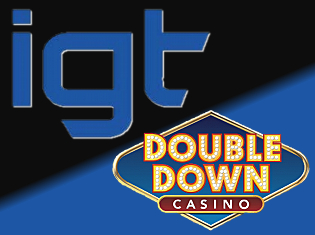DoubleDown Social Casino Illinois Customer Lawsuit Dismissed, Angry Patron Lost $1K in Virtual Chips
Posted on: April 1, 2016, 11:48h.
Last updated on: April 1, 2016, 12:22h.
IGT’s DoubleDown multiplatform social casino site has survived a class action lawsuit attempt from a disgruntled Illinois customer who claimed that the free gaming platform offers “nothing more than camouflaged unlawful games of chance.”

Plaintiff Margo Phillips blew $1,000 in real money on virtual, value-less chips on the site before deciding she wanted to claw back every play cent. Phillips claimed that because DoubleDown uses “gambling mechanics” in its games, it is tantamount to actual gambling.
Well, except for real money being involved, but other than that.
In a class action lawsuit filed at the Circuit Court of Cook County, Illinois, Phillips said she wanted the DoubleDown site to be shut down and money refunded to customers in Illinois. The lawsuit was filed on behalf of all citizens of the state who had lost over $50 playing at DoubleDown, under the antiquated Illinois Loss Recovery Act (ILRA).
Claw-back Law Dragged Up
The 19th century law states that any Illinois gambler who loses $50 or more has the right to sue the winner to get the money back. It also states that should the losing gambler not sue the winner within sixth months, then “any person” is permitted to sue on behalf of all losers, for up to three times the amount.
The law was originally designed to protect destitute families who’d had their last dollar stolen by relatives, which was subsequently gambled away.
Phillips says she began playing on DoubleDown in January of 2013, and soon began purchasing virtual (and value-less) chips with real money, once she had played through the original supply of free chips. Because she paid for the chips, she argues, they had a monetary value, just like chips purchased in a casino, and therefore the services offered by DoubleDown were tantamount to illegal gambling.
According to Phillips, as well as ILRA, DoubleDown was in violation of the Illinois Consumer Fraud and Deceptive Business Practices Act, and was guilty of unjustly enriching itself through the use of “gambling devices,” another no-no under Illinois state law.
The filing would have had to establish that online social casino games can be defined as “gambling devices,” and that IGT had procured money from the plaintiff in an illegal manner.
Define “Gambling”
But the judge, unlike Phillips, wasn’t buying any of it.
Judge Edmond Chang noted that ILRA requires a winner and a loser from the outcome of a gambling proposition. Because virtual chips bought from DoubleDown cannot be cashed in for real money, the social casino site cannot lose anything from the proposition, and so Phillips was on shaky ground.
In fact, broadly speaking, Phillips was asking the court to reconsider the very definition of gambling as it’s construed in pretty much every state in the US: namely, the proposition that something of value is risked upon the outcome of an event or game that is subject to chance in the hope of receiving something else of equal or greater value.
While paying for virtual chips constitutes a financial stake, with no financial reward involved, no form of gambling has occurred, by any legal definition, at least.
In fact, one could say that Phillip’s decision to sue DoubleDown is a far better example of gambling than anything that happens on the social casino site. And in this case, it was a losing bet.
Related News Articles
Illinois Casinos To Pay More Than Their Fair Share in Taxes
‘Worst Case Scenario’ Wager Slash on FOBTs Pummels UK Bookmaker Stocks
Most Popular
FTC: Casino Resort Fees Must Be Included in Upfront Hotel Rates
Genovese Capo Sentenced for Illegal Gambling on Long Island
NBA Referees Expose Sports Betting Abuse Following Steve Kerr Meltdown
UPDATE: Former Resorts World & MGM Grand Prez Loses Gaming License
Most Commented
-
UPDATE: Whiskey Pete’s Casino Near Las Vegas Closes
— December 20, 2024 — 30 Comments -
Caesars Virginia in Danville Now Accepting Hotel Room Reservations
— November 27, 2024 — 9 Comments -
UPDATE: Former Resorts World & MGM Grand Prez Loses Gaming License
— December 19, 2024 — 8 Comments -
FTC: Casino Resort Fees Must Be Included in Upfront Hotel Rates
— December 17, 2024 — 7 Comments
















No comments yet